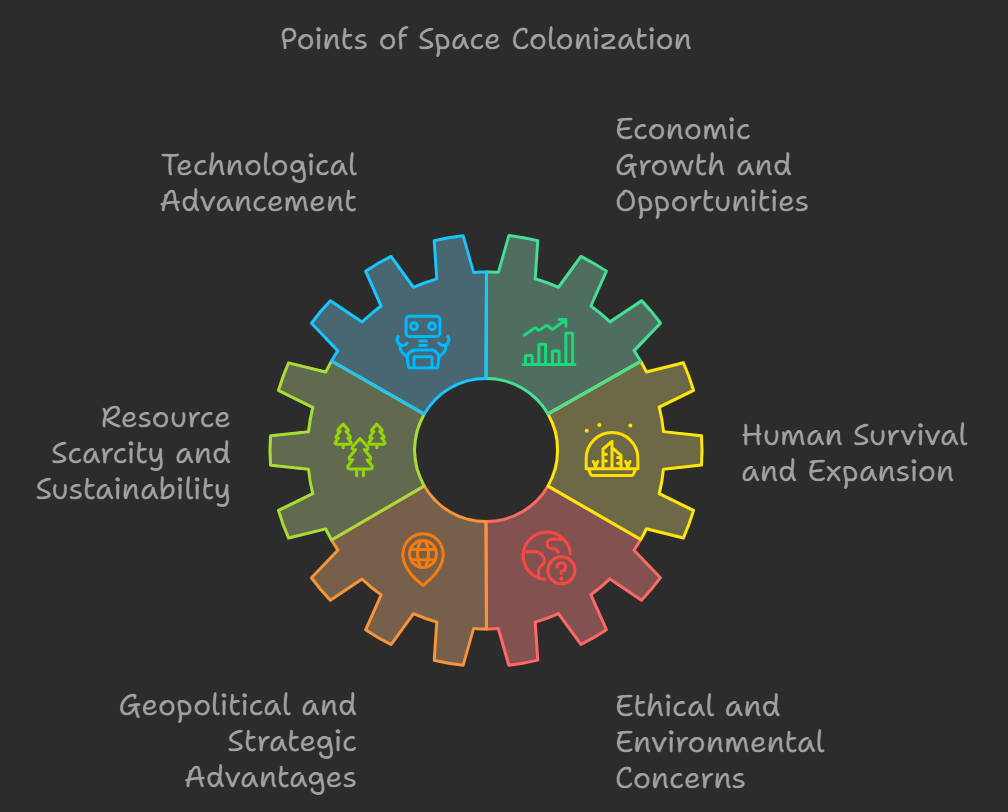(簡単★~難しい★★★★★)語彙難易度★★
目次
Question: The governments should invest more in space colonization.
政府は、宇宙植民にもっと資金を投入すべきである
トレーニング手順
- 分野・トピック毎の観点とキーワードをまとめる
以下の画像のようなイメージ図にしておくと、記憶に定着するのでおススメ - 自分が書きやすい立場・観点で実際に書く
分からない表現はすぐに調べて15分程度で書く - 続いて、先ほどとは反対意見で書いてみる
分からない表現はすぐに調べて15分程度で書く - そのトピックについて実際に誰かと話す、又は1分スピーチをする
- 同じ分野で3つくらいの意見論述を作成する
例えば、宇宙なら宇宙植民・宇宙採掘・宇宙旅行など
Space colonization とは:宇宙移民、または宇宙植民とは、地球外に恒久的で自給自足可能な人類の居住地を作成するため、またはテラフォーミングを行う目的で移住する者達を指す。(出典:Weblio)
宇宙植民観点 (Perspectives)
単純化したイラストで整理することで、記憶に定着しやすくなります。

- Technological Advancement (技術的進歩)
Space colonization requires cutting-edge technologies, which can drive innovation in fields such as AI, robotics, and renewable energy. - Economic Growth and Opportunities (経済成長と機会)
Investment in space exploration can lead to new industries, jobs, and global economic growth. - Resource Scarcity and Sustainability (資源の枯渇と持続可能性)
Expanding into space offers access to untapped resources, addressing potential resource shortages on Earth. - Human Survival and Expansion (人類の生存と拡張)
Space colonization serves as a contingency plan for humanity in case of global catastrophes, ensuring long-term survival. - Geopolitical and Strategic Advantages (地政学的・戦略的利点)
Countries investing in space colonization gain a strategic advantage in global politics and defense. - Ethical and Environmental Concerns (倫理的・環境的懸念)
Space exploration raises ethical questions about the exploitation of celestial bodies and potential environmental impacts.
宇宙植民キーワード (Keywords)
- space exploration (宇宙探査)
- extraterrestrial resources (地球外資源)
- interplanetary colonization (惑星間植民)
- technological innovation (技術革新)
- economic expansion (経済拡大)
- long-term sustainability (長期的持続可能性)
- human resilience (人間の回復力)
- space economy (宇宙経済)
- strategic dominance (戦略的優位)
- ethical implications (倫理的意味合い)
使われそうな動詞 (Verbs)
- pioneer (先駆ける)
- allocate (割り当てる)
- propel (推進する)
- exploit (利用する)
- harvest (採取する)
- sustain (維持する)
- innovate (革新する)
- colonize (植民地化する)
- secure (確保する)
- safeguard (保護する)
使われそうな形容詞 (Adjectives)
- cutting-edge (最先端の)
- sustainable (持続可能な)
- viable (実行可能な)
- innovative (革新的な)
- strategic (戦略的な)
- ethical (倫理的な)
- unprecedented (前例のない)
- global (世界的な)
- autonomous (自律的な)
- scalable (スケーラブルな)
使われそうな副詞 (Adverbs)
- exponentially (指数関数的に)
- strategically (戦略的に)
- sustainably (持続可能に)
- comprehensively (包括的に)
- collaboratively (協力的に)
- ethically (倫理的に)
- efficiently (効率的に)
- proactively (積極的に)
- innovatively (革新的に)
- systematically (体系的に)
Agree: 宇宙植民にもっと資金を投入すべき
The government should invest more in space colonization for several compelling reasons. As humanity faces challenges such as resource scarcity and potential global catastrophes, space exploration offers both solutions and opportunities for future growth.
First, space colonization will drive **technological advancement**. Developing technologies for human survival in space requires breakthroughs in artificial intelligence, robotics, and renewable energy. These innovations could not only make space travel feasible but also have valuable applications on Earth. For instance, advancements in energy efficiency and automation could transform industries, leading to overall technological progress that benefits society.
Second, space colonization addresses the problem of **resource scarcity**. Earth’s natural resources are finite and are being rapidly depleted. However, space offers access to abundant resources, such as minerals from asteroids and lunar water. By mining these untapped resources, we can alleviate the pressure on Earth’s environment and secure materials essential for technological development and human sustainability.
Finally, space colonization is essential for **human survival and expansion**. With threats such as climate change, nuclear conflict, or pandemics, the Earth alone may not be a safe haven forever. Establishing colonies on other planets or moons offers humanity a backup plan. If a global catastrophe occurs, space settlements could ensure the survival of human civilization.
In conclusion, investing in space colonization is not only a strategic choice for technological and economic growth but also a vital step for securing humanity’s long-term survival. Governments should prioritize this endeavor for the future of our species. (243 words)
賛成意見の訳と用語
The government should invest more in space colonization for several compelling reasons. As humanity faces challenges such as resource scarcity and potential global catastrophes, space exploration offers both solutions and opportunities for future growth.
イントロダクション: 宇宙植民への投資の必要性
政府は、いくつかの説得力のある理由から、宇宙植民にもっと投資すべきである。人類が資源不足や地球規模の災害の脅威に直面する中、宇宙探査は解決策と未来の成長の機会を提供する。
- compelling: 「説得力のある」という意味で、persuasive(説得力のある)やconvincing(納得できる)と同義です。理由や根拠を強調する際に便利です。
- resource scarcity: 「資源の枯渇」という表現で、depletion of resources(資源の枯渇)やresource shortages(資源不足)とも言い換えられます。
- potential: 「潜在的な」という意味で、possible(可能性のある)やlatent(潜在的な)といった表現が類似します。
First, space colonization will drive technological advancement. Developing technologies for human survival in space requires breakthroughs in artificial intelligence, robotics, and renewable energy. These innovations could not only make space travel feasible but also have valuable applications on Earth. For instance, advancements in energy efficiency and automation could transform industries, leading to overall technological progress that benefits society.
ボディ1: 技術的進歩を促進する宇宙開発
まず、宇宙植民は技術革新を促進する。宇宙での人間の生存に必要な技術を開発する過程で、人工知能、ロボティクス、再生可能エネルギーなどの分野での画期的な進歩が求められる。これらの技術は、宇宙旅行を現実のものにするだけでなく、地球上で応用可能な価値のある技術革新にもつながる。例えば、エネルギー効率や自動化の進展が産業を変革し、社会全体に恩恵をもたらすだろう。
- breakthroughs: 「飛躍的進歩」という意味で、milestones(画期的な出来事)やinnovations(革新)も類似の表現です。技術進歩を強調する際に使われます。
- feasible: 「実現可能な」という意味で、practicable(実行可能な)、achievable(達成可能な)といった類語があります。可能性について言及する際に役立ちます。
- transform: 「変革する」という意味で、revolutionize(革命をもたらす)やreshape(再構築する)とも言い換えられます。劇的な変化を表現したいときに使います。
Second, space colonization addresses the problem of resource scarcity. Earth’s natural resources are finite and are being rapidly depleted. However, space offers access to abundant resources, such as minerals from asteroids and lunar water. By mining these untapped resources, we can alleviate the pressure on Earth’s environment and secure materials essential for technological development and human sustainability.
ボディ2: 資源の枯渇問題への解決策
次に、宇宙植民は資源不足の問題を解決する。地球の天然資源は有限であり、急速に枯渇している。しかし、宇宙には豊富な資源が存在し、小惑星からの鉱物や月面の水などが利用できる。これらの未開拓の資源を採掘することで、地球の環境への負担を軽減し、人類の持続可能性に不可欠な材料を確保することができる。
- finite: 「有限の」という意味で、limited(限られた)やexhaustible(使い尽くせる)も同様の表現です。資源の有限性を論じる際に適しています。
- abundant: 「豊富な」という意味で、plentiful(豊富な)、bountiful(潤沢な)も類義語として使えます。豊富な資源について強調する表現です。
- alleviate: 「緩和する」という意味で、ease(軽減する)やmitigate(軽減する)も類似表現です。問題解決の方法について述べる際に便利です。
Finally, space colonization is essential for human survival and expansion. With threats such as climate change, nuclear conflict, or pandemics, the Earth alone may not be a safe haven forever. Establishing colonies on other planets or moons offers humanity a backup plan. If a global catastrophe occurs, space settlements could ensure the survival of human civilization.
ボディ3: 人類生存のための保険としての宇宙植民
最後に、宇宙植民は人類の生存と拡大に不可欠である。気候変動、核戦争、パンデミックなどの脅威により、地球が永遠に安全な場所であるとは限らない。他の惑星や月に植民地を築くことで、人類のバックアッププランを確保できる。もし地球規模の災害が発生した場合、宇宙植民地が人類文明の存続を保証する可能性がある。
- essential: 「不可欠な」という意味で、vital(極めて重要な)やindispensable(必要不可欠な)と同義です。重要性を強調する際に役立ちます。
- haven: 「避難所」という意味で、refuge(避難所)やsanctuary(聖域)とも表現できます。安全な場所を示す際に使います。
- backup plan: 「予備計画」という意味で、contingency plan(非常事態対応計画)、alternative plan(代替計画)も同じ意味を持ちます。リスク管理や安全策について言及する際に使用します。
In conclusion, investing in space colonization is not only a strategic choice for technological and economic growth but also a vital step for securing humanity’s long-term survival. Governments should prioritize this endeavor for the future of our species.
結論: 宇宙植民への投資は未来への鍵
結論として、宇宙植民への投資は、技術的・経済的成長のための戦略的選択であるだけでなく、人類の長期的な生存を確保するための重要な一歩である。政府はこの取り組みを優先すべきである。
- strategic choice: 「戦略的選択」という意味で、calculated decision(計算された決定)、tactical move(戦術的行動)とも言い換え可能です。戦略的な意思決定を表現する際に使います。
- vital: 「極めて重要な」という意味で、crucial(極めて重要な)、critical(重大な)も同様の意味を持ちます。重要な事柄を強調する際に便利です。
- prioritize: 「優先する」という意味で、emphasize(強調する)やgive precedence to(優先順位を与える)も同様に使えます。政策決定において優先事項を示すときに適しています。
Disagree: 宇宙植民にもっと資金を投入すべきではない
The government should not invest in space colonization for several reasons. While the idea of expanding into space may seem exciting, there are significant concerns regarding ethics, resource use, and geopolitical risks.
First, space colonization raises serious ethical and environmental concerns. The exploitation of celestial bodies, such as planets and asteroids, poses the risk of irreparably damaging these environments. The ethical implications of claiming and using space resources without proper regulation could lead to the same environmental and social injustices seen on Earth, but on a cosmic scale.
Second, the vast resources required for space colonization could hinder economic growth and opportunities on Earth. Space exploration demands enormous financial investments that could be better allocated to pressing issues such as poverty, healthcare, and environmental protection. Rather than diverting funds to uncertain ventures, governments should focus on improving conditions and creating economic opportunities for their populations on Earth.
Lastly, space colonization could lead to dangerous geopolitical and strategic tensions. As nations compete for dominance in space, conflicts over resources, territories, and strategic advantages are likely to intensify. This rivalry could result in an arms race or even military conflicts in space, further destabilizing global relations and threatening security on Earth.
In conclusion, while space colonization offers potential opportunities, the ethical dilemmas, economic risks, and geopolitical tensions it may create suggest that government investment in this area is not justified. Priority should be given to solving issues on Earth before looking to space.
反対意見の訳と用語
The government should not invest in space colonization for several reasons. While the idea of expanding into space may seem exciting, there are significant concerns regarding ethics, resource use, and geopolitical risks.
イントロ:宇宙植民への投資に伴う懸念
政府が宇宙植民に投資すべきではない理由はいくつかある。宇宙への拡大は魅力的に思えるかもしれないが、倫理的問題、資源の使用、地政学的リスクに関する懸念がある。
- concerns: 「懸念」の意味で頻出の単語ですが、類語としてapprehensions(懸念、危惧)やfears(恐れ)が考えられます。文脈に応じて使い分けましょう。
- regarding: 「~に関して」という意味で、concerningやwith regard toと同じ意味で使えます。エッセイの接続に便利です。
- expanding into: 「~に拡大する」という表現で、venturing into(~に乗り出す)、moving into(~に進出する)も類似表現です。
First, space colonization raises serious ethical and environmental concerns. The exploitation of celestial bodies, such as planets and asteroids, poses the risk of irreparably damaging these environments. The ethical implications of claiming and using space resources without proper regulation could lead to the same environmental and social injustices seen on Earth, but on a cosmic scale.
ボディ1:倫理的および環境的懸念
まず、宇宙植民には深刻な倫理的および環境的な懸念が伴う。惑星や小惑星の開発は、これらの環境を取り返しのつかない形で損なうリスクがある。宇宙資源を規制なしに独占することは、地球で見られる環境破壊や社会的不正が宇宙規模で発生する可能性をはらんでおり、倫理的な問題が生じる。
- exploitation: 「搾取、開発」という意味で、utilization(利用)やdevelopment(開発)と置き換えられます。ただしexploitationは通常、否定的な意味を含むので注意が必要です。
- irreparably: 「修復不可能な」という意味の副詞で、permanently(永続的に)やirreversibly(不可逆的に)とも言い換え可能です。強調表現に便利です。
- implications: 「影響、結果」という意味で、consequences(結果)やrepercussions(影響)と類似の意味を持ちます。
Second, the vast resources required for space colonization could hinder economic growth and opportunities on Earth. Space exploration demands enormous financial investments that could be better allocated to pressing issues such as poverty, healthcare, and environmental protection. Rather than diverting funds to uncertain ventures, governments should focus on improving conditions and creating economic opportunities for their populations on Earth.
ボディ2:地球上の経済成長を妨げるリスク
次に、宇宙植民に必要な膨大な資源は、地球上での経済成長や機会の妨げになる可能性がある。宇宙探査には巨額の資金が必要であり、その資金を貧困、医療、環境保護といった差し迫った課題に振り向けるべきだろう。不確実な事業に資金を分散させるよりも、政府は地球上の生活条件を改善し、経済的な機会を創出することに注力すべきである。
- hinder: 「妨げる」という意味で、impede(妨害する)、obstruct(遮る)といった類語があります。否定的な意味を強調する際に有効です。
- allocated: 「割り当てる」という動詞で、assigned(配分する)、distributed(配布する)とも言い換え可能です。資源の配分に関する議論でよく使われます。
- pressing: 「差し迫った」という形容詞で、urgent(緊急の)やcritical(重要な)も同じように使えます。問題の緊急性を示すのに効果的です。
Lastly, space colonization could lead to dangerous geopolitical and strategic tensions. As nations compete for dominance in space, conflicts over resources, territories, and strategic advantages are likely to intensify. This rivalry could result in an arms race or even military conflicts in space, further destabilizing global relations and threatening security on Earth.
ボディ3:地政学的緊張の危険性
最後に、宇宙植民は地政学的および戦略的な緊張を引き起こす可能性がある。各国が宇宙での覇権を競う中、資源や領土、戦略的優位性を巡る争いが激化する恐れがある。この競争が軍拡競争や宇宙での軍事衝突に発展し、地球上の安全を脅かす可能性もある。
- tensions: 「緊張」という意味で、conflicts(対立)、frictions(摩擦)とも置き換えられます。国際関係や競争においてよく使用されます。
- dominance: 「支配、優勢」という意味で、supremacy(優位)、control(支配権)も同様に使えます。特に地政学的な文脈で重要な単語です。
- destabilizing: 「不安定化させる」という意味で、undermining(弱体化させる)、disrupting(混乱させる)という表現も可能です。リスクや影響を論じる際に使える語彙です。
In conclusion, while space colonization offers potential opportunities, the ethical dilemmas, economic risks, and geopolitical tensions it may create suggest that government investment in this area is not justified. Priority should be given to solving issues on Earth before looking to space.
結論:地球の課題に集中すべき理由
結論として、宇宙植民には可能性があるものの、倫理的な課題、経済的リスク、地政学的緊張があるため、政府がこの分野に投資する理由は薄い。まず地球上の問題解決を優先すべきである。
- potential opportunities: 「潜在的な機会」という表現で、possible opportunities(可能な機会)やprospects(将来性)とも置き換えられます。
- dilemmas: 「ジレンマ」という意味で、predicaments(窮地)やquandaries(難問)とも使えます。複雑な問題を示す際に有効です。
- justified: 「正当化される」という意味で、valid(妥当な)やdefensible(弁護できる)とも言い換え可能です。投資の正当性を論じる際に役立ちます。
まとめ
ここでは、先に紹介した賛成意見と反対意見、それぞれのエッセイと語彙解説を振り返り、学習のポイントを整理します。
賛成意見の要点
1. 技術的進歩の促進
宇宙植民は人工知能やロボティクス、再生可能エネルギーといった分野で技術的ブレークスルーを引き起こし、これが地球上でも多くの産業に応用できる可能性があります。例えば、エネルギー効率の向上や自動化技術が産業全体を変革し、技術進歩が社会全体の利益に繋がります。
2. 資源の枯渇問題への対応
地球上の資源が有限である一方で、宇宙には小惑星や月に豊富な資源が眠っています。これらの資源を採掘することで、地球の環境負荷を軽減し、持続可能な未来に向けた一歩となります。
3. 人類の生存と拡張
気候変動や核戦争、パンデミックなどのリスクを考えると、地球だけに依存するのは危険です。宇宙に植民地を築くことは、人類の長期的な生存を保障する「保険」となり得ます。
賛成意見で学ぶべき語彙ポイント
- compelling(説得力のある)、feasible(実現可能な)、alleviate(緩和する)など、論理的に説得力のある表現や、問題解決を示す語彙を学びました。
- 技術革新や持続可能性を語る際に、breakthroughs(飛躍的進歩)、resource scarcity(資源の枯渇)といった専門用語の使い方も理解できたはずです。
反対意見の要点
1. 倫理的・環境的懸念
宇宙資源の無規制な開発は、地球上で見られる環境破壊や社会的不公正を、宇宙でも引き起こしかねません。これには深刻な倫理的問題が伴います。
2. 経済的負担と機会損失
宇宙探査には莫大な費用がかかり、その資金は貧困対策や医療、環境保護といった地球上の緊急課題に使われるべきです。宇宙への投資は、不確実な見返りに対するリスクが高すぎます。
3. 地政学的・戦略的リスク
宇宙での領土や資源を巡って国々が競争を繰り広げれば、国際的な緊張が高まり、さらには軍事衝突の可能性もあります。これにより、地球上の安全保障も脅かされるかもしれません。
反対意見で学ぶべき語彙ポイント
- exploitation(搾取)、implications(影響)、destabilizing(不安定化させる)など、倫理的・戦略的な問題を論じる際に重要な単語を確認しました。
- また、geopolitical tensions(地政学的緊張)やeconomic opportunities(経済的機会)といった複雑なテーマに関する語彙の使い方も強化できたはずです。
賛成・反対意見を通じて学んだこと
両方のエッセイを通じて、賛否両論における論理的な構築方法と適切な語彙の使用法を習得しました。エッセイでは、まず明確な立場を示し、それをサポートする理由を提示することが重要です。その際、特定の観点にフォーカスし、説得力のある語彙を駆使して主張を支えることが求められます。
今後の練習方法
- 語彙の確認と応用: 各段落で紹介した語彙を自分でも使えるように、同じテーマで短いパラグラフを書いてみましょう。
- 別の観点からのエッセイ練習: 今回触れなかった他の観点(例: 経済成長や倫理的懸念)を使って、賛成・反対両方のエッセイを書いてみるとさらに力がつきます。
- 時事問題との結びつき: 宇宙探査や技術革新についての最新のニュースを読み、今回学んだ語彙や構成を実際の議論にどう適用できるか考えてみましょう。
宇宙植民への投資というテーマは、技術革新や資源問題、倫理的な課題まで広くカバーしており、英検1級レベルの英作文にはうってつけの題材です。今回学んだ賛成・反対意見のエッセイと語彙解説をもとに、論理的で説得力のあるエッセイを書く練習を続けていきましょう。
その他、おすすめの勉強法などは、こちらに掲載しています:
英作文(意見論述・要約問題)対策テキスト

「どんなテキストがおすすめですか?」とよく聞かれるのですが、「問題量が多い」ものと「知識量を増やせるもの」の2種類を準備すると良いかと思います。
また、あまりにも文法解説が長いテキストは、英検1級対策としては、「?」という感じがします。
「何を、どんな観点で、どう伝えるか」にフォーカスして書かれたテキストを選んでください。
英作文テキストは、「最低でも3ラウンドする」。語彙や表現を増やす系のテキストは「最低でも5ラウンドする」つもりで、1ページごとに時間をかけすぎず、分からない時はすぐにググりながらテンポよく進めていきます。




